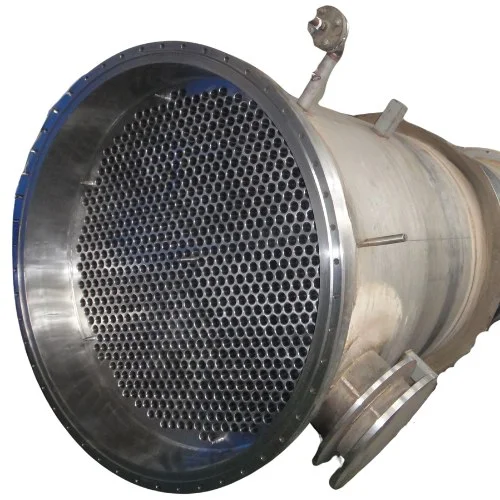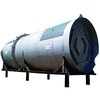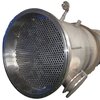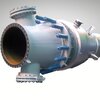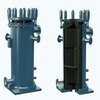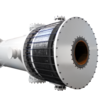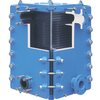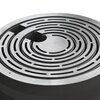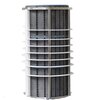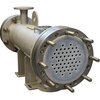Titanium, Nickel Alloys and Zirconium Shell and Tube Heat Exchangers
-
High-Performance Nickel Alloys, Titanium, Zirconium Heat Exchangers for Corrosive Applications
These materials ensure optimal durability, safety, and performance across industries where aggressive media, high temperatures, and stringent operational conditions demand superior corrosion resistance.
Global Expertise & Project Support
With production sites in Salem (USA) and Xianda (China), Mersen provides:
- Custom-engineered solutions compliant with complex customers' requirements.
- Compliance with international standards: ASME, EN 13445, PED, and JIS
- Dedicated project management ensuring quality and on-time delivery.
-
Mersen Xianda
Industrial Capabilities
Xianda is a key manufacturing hub for nickel alloys, titanium and zirconium heat exchangers production in China, equipped with advanced facilities and engineering expertise to ensure high-quality equipment.
-
- Workshop Area: 10,000m² dedicated to the manufacturing of reactive metal equipment.
- Large-Scale Equipment Handling: Capable of manufacturing heat exchangers up to 5m in diameter. Larger diameter upon request.
- Cutting & Forming: Water jet cutting systems, rolling machines, and hydraulic pressing are perfectly adapted to the reactive metals manufacturing process.
- Welding Expertise: Equipped with state-of-the-art GTAW and plasma welding machines, high argon purity shielding gas.
- Quality Control: In-house non-destructive testing (NDT) including radiographic, ultrasonic, liquid penetrant, and magnetic testing, along with Level III inspectors.
- Engineering capacities: Autocad (2D) and Inventor (3D), PV Elite (ASME calculation), SW6 and Microprotol
- International Design and manufacturing codes: ASME U, EN13445, PED Module G, JIS Class I and II Pressure Vessels, KGS/Kosha, GB 150/151 – A2, A4 and GC2
- Dedicated teams for each project, using international project management tools, ensuring timely delivery and compliance with quality requirements.
-
Material Selection for Corrosive Chemical Processes
The selection of materials for process equipment is a critical factor in ensuring safety, operational efficiency, and environmental compliance. Choosing the wrong material can lead to high corrosion rates, increased operational expenses (OPEX), safety hazards, and potential contamination of products. These consequences cannot be afforded in processes such as API for example.
To optimize equipment lifespan and performance, material selection is based on:
-
Key Criteria for Material Selection
-
Corrosiveness of Process fluids
The decisive factor is the corrosion resistance of the material with the process fluid. -
Operating conditions
Concerns temperature, pressure... -
Availability of raw materials
Some raw materials lead time could be much longer -
Project Budget
The choice of materials depends on the project budget.
-
-
Understanding Corrosion Resistance in Reactive Metals
Materials like titanium, zirconium, and nickel alloys resist corrosion due to their ability to form a stable and chemically inert oxide layer, providing excellent protection against aggressive environments. However, if this protective layer is damaged, these metals can be rapidly attacked.
-
Titanium Heat Exchangers
Titanium is widely recognized for its exceptional resistance to various corrosive environments, making it ideal for heat exchangers in aggressive media. The chemical industry uses three main grades of pure or alloyed material - 1, 2, 7 and 16- among 25.
Key advantages include:
- Self-forming passive oxide layer that enhances longevity
- Resistance to wet chlorine gas and hypochlorite.
- Stability in chloride-containing solutions, such as NaCl and KClO, up to 120°C.
- Full compatibility with oxidizing acids like nitric acid.
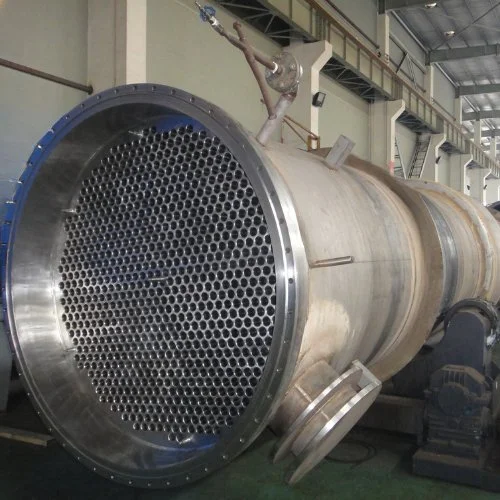
- Desalination and seawater processes.
- Brine concentration in chlor-alkali production.
- Coke oven gas treatment.
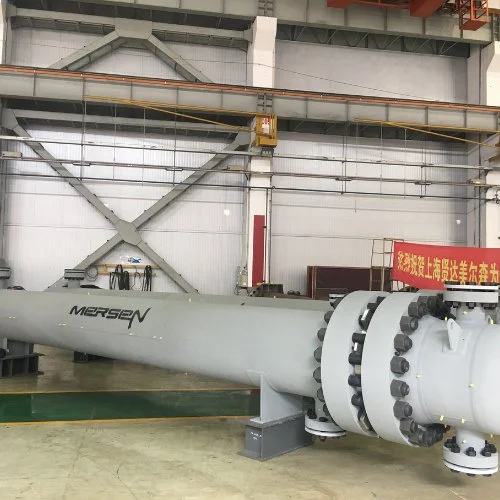
-
Nickel Alloys Heat Exchangers
Nickel-based alloys, such as Hastelloy, Inconel, Monel, and Duplex stainless steels, offer excellent mechanical strength and resistance to extreme chemical conditions:
- Hastelloy C resists sulfuric acid (H2SO4) concentrations up to 80% at 80°C.
- Hastelloy B3 provides stability in hydrochloric acid (HCl) up to 33% at 80°C.
- Nickel 200 performs well in highly alkaline conditions, including NaOH and HF.
- Duplex and Super Duplex alloys are suitable for seawater applications
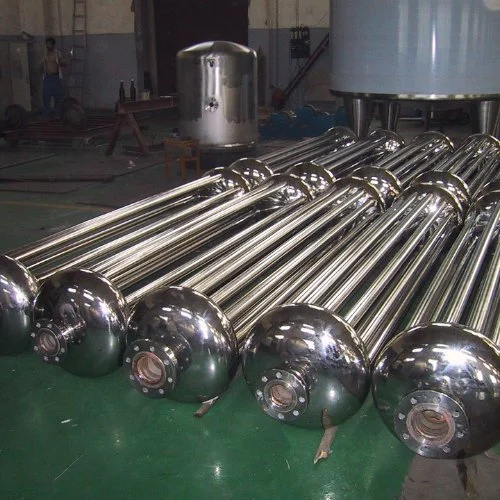
- Chemical processing
- Desalination and offshore applications.
- API production
- Phosgene-based processes requiring Monel 400.
- Caustic soda concentration
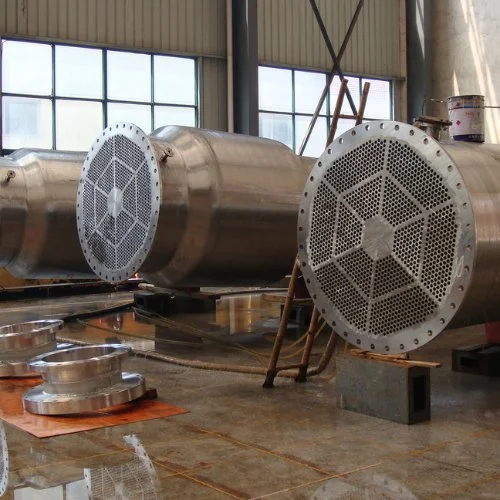
-
Zirconium Heat Exchangers
Zirconium, particularly unalloyed Grade 702, offers superior resistance to a variety of acidic environments:
- Resistant to hydrochloric acid (HCl) up to 33% concentration at 140°C.
- Stable in sulfuric acid (H2SO4) concentrations up to 60% at 140°C.
- Sensitivity to oxidizing impurities such as Fe3+ and Cu2+.
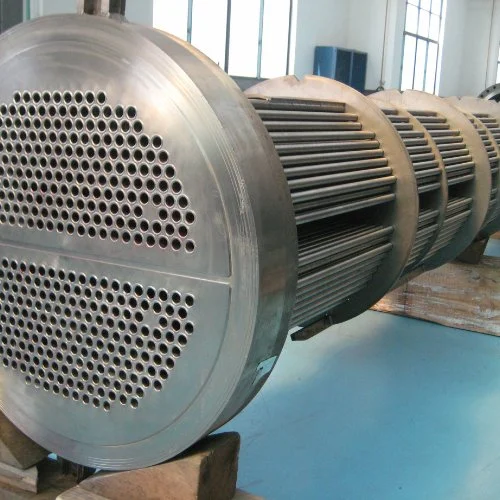
- Acetic and formic acid processing.
- Methionine and organic silicone production.
- Aramid fiber manufacturing.
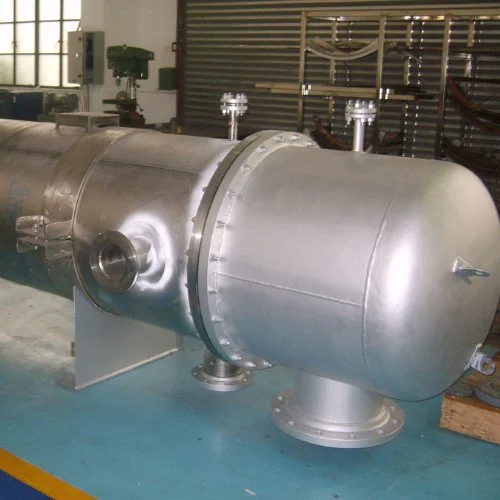
-
Contact
Contact our experts
Proper material selection in the design of process equipment directly impacts safety, operational costs, and environmental compliance. By choosing the right corrosion-resistant materials—whether nickel alloys, titanium, or zirconium—our customers can ensure reliable, long-lasting performance in aggressive chemical environments.
-
Documentation
Brochures and Flyers
pdf - 6 MB | Nov. 24, 2025
Reactive Metals Equipment Brochure
pdf - 3.46 MB | Dec. 16, 2025
The reactive metal (titanium shell and tube heat exchangers, nickel alloys heat exchangers, zirconium shell and tube heat exchangers) equipment is part of the Mersen range of heat exchangers resistant to corrosion and hot environments. Mersen designs and manufactures graphite cylindrical block Polybloc®, graphite shell and tube heat exchanger, cubic block heat exchanger, graphite plate and annular groove heat exchangers. We also manufacture graphite columns and graphite quenches. We propose a complete range of silicon carbide block, and shell and tube heat exchangers as well as steam jet vacuum pumps. We offer PTFE lined columns and vessels, as well as PTFE-lined steel pipes and fittings, and PTFE bellows We supply a complete range of graphite busting discs. We manufacture process equipment in reactive metals such as titanium, zirconium and nickel alloys.
